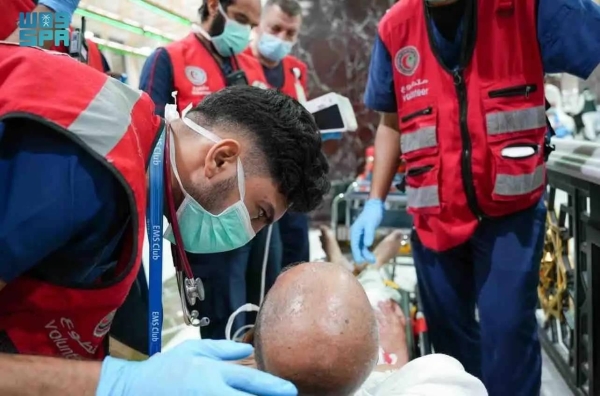The Saudi Red Crescent Authority (SRCA) in Makkah recently made headlines for their swift response to a medical emergency at the Grand Mosque. A Pakistani Umrah performer had lost consciousness and suffered cardiac arrest, but thanks to the quick actions of the SRCA ambulance teams, he was successfully revived. The incident occurred at 11:19 AM when the SRCA received an alert about an unconscious man at the King Fahd Walkway. Upon arrival, the ambulance teams found the man unresponsive and immediately began CPR using a defibrillator (AED) available at the mosque. Their timely intervention with the “LUCAS” device helped restore the performer’s pulse, and he was then transported to a medical facility for further care.
This incident highlights the importance of having trained medical personnel and resources readily available in crowded public spaces like the Grand Mosque in Makkah. The ability of the SRCA ambulance teams to respond quickly and effectively in a high-stress situation ultimately saved the life of the Umrah performer. The presence of a defibrillator (AED) at the mosque also played a crucial role in this successful outcome, demonstrating the importance of having life-saving equipment accessible to the public in case of emergencies.
The successful revival of the Pakistani Umrah performer serves as a reminder of the vital role that organizations like the SRCA play in ensuring the safety and well-being of individuals in communities. Their dedication to providing emergency medical services, such as CPR and the use of defibrillators, can make a life-saving difference in critical situations. As the incident at the Grand Mosque shows, having trained medical professionals who can respond quickly and effectively to emergencies can mean the difference between life and death.
The SRCA ambulance teams in Makkah are equipped with the necessary skills and resources to handle medical emergencies in a variety of settings, including busy public spaces like the Grand Mosque. Their ability to successfully revive the Umrah performer who suffered cardiac arrest is a testament to their training and expertise in providing emergency medical care. By investing in training and equipping their personnel with life-saving tools like defibrillators, the SRCA is able to make a significant impact on the health and well-being of individuals in need of emergency medical assistance.
In addition to their quick response and use of life-saving equipment, the SRCA ambulance teams in Makkah also demonstrate compassion and care in their interactions with those in need of medical assistance. The professionalism and dedication shown by the ambulance teams in their efforts to revive the Umrah performer reflect the organization’s commitment to providing high-quality emergency medical services to the community. Their timely intervention and successful revival of the performer showcase the importance of having skilled and compassionate medical professionals available to respond to emergencies.
Overall, the story of the Pakistani Umrah performer who was successfully revived by the SRCA ambulance teams in Makkah serves as a powerful example of the impact that well-trained and equipped medical personnel can have in saving lives. By responding quickly to emergencies, utilizing life-saving equipment like defibrillators, and demonstrating compassion and care in their interactions with patients, organizations like the SRCA play a crucial role in ensuring the health and safety of individuals in communities. The successful outcome of this incident reinforces the importance of investing in emergency medical services and resources to effectively respond to critical situations and provide lifesaving care when it matters most.










